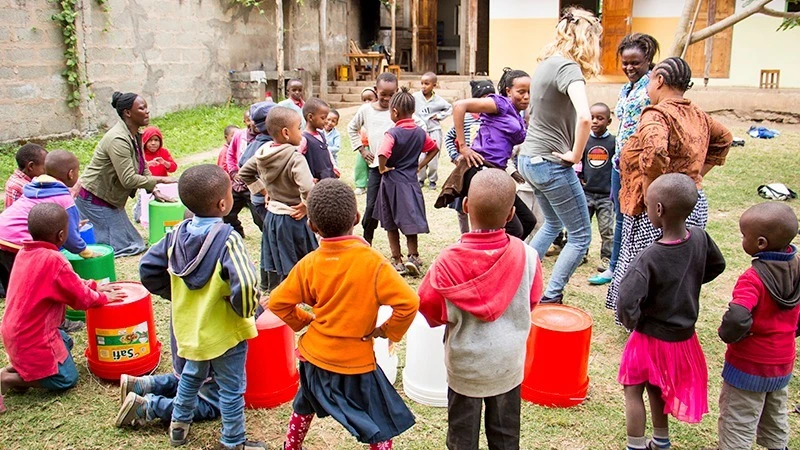Navigating the new norm: Ensuring safe, stimulating daycare for a changing society

IN today’s rapidly evolving society, traditional family structures have changed dramatically. In my rural Kagera area, where I grew up, it was common for extended family members to live together, sharing responsibilities and childcare. This communal approach meant there was no need for housemaids, as relatives would collectively handle household chores and child-rearing.
However, the shift towards nuclear families, driven by individualism and economic pressures, has led to significant changes. Many parents now face the challenge of balancing work and childcare, leading to an increased demand for daycare centers. These centers have become a crucial solution for many families, particularly in urban areas, where traditional support systems have diminished.
The early years of a child's life, from birth to age two, are critical for emotional, linguistic, and social development. Ideally, this nurturing takes place at home, with parents and caregivers closely involved in the child's growth. Yet, the rise in child abuse—encompassing physical, emotional, psychological, and sexual abuse—has heightened the need for safe, regulated environments where children can be cared for properly.
Sexual abuse, including rape, sodomy, exposure to pornography, and involvement in sexual content production, represents a severe threat. These abuses inflict deep psychological scars, manifesting as depression, anxiety, and long-term stress. Physically, abused children may suffer from injuries and chronic illnesses that hinder their growth and development, while their social interactions may be adversely affected, leading to diminished self-esteem and social withdrawal.
In response to these dangers, many parents are turning to daycare centers as a safer alternative. These facilities, increasingly prevalent in cities, offer a controlled environment where children are supervised and protected. Regulation 4(1) of the 2012 Day Care Centers and Nursery Schools Regulations mandates that only registered individuals can operate such centers. This regulation underscores the importance of adhering to legal requirements to avoid penalties and ensure children's safety.
The process of registering a daycare center involves compliance with the Child Act of 2009 and the 2012 regulations. The premises must be inspected and approved by a local health officer to confirm their suitability for child care (Regulation 4(3)). If the center operates in a leased property, the lease agreement must be valid for at least three years (Regulation 4(4)).
Additionally, the center’s owner must demonstrate financial stability and ensure the facility is equipped with adequate play equipment. Applicants must be mentally sound and commit to not transferring or selling the center’s certificate.
Despite these regulations, some parents still face challenges finding safe and reliable daycare services. In Shinyanga, a region grappling with limited resources and varying standards, parents have shared their reasons for choosing daycare centers. “I send my child to a daycare center because I can’t be sure of the safety of housemaids,” said one anonymous parent. “With the increasing reports of abuse, it feels like a safer option to have my child in a regulated environment.”
Another parent, also wishing to remain anonymous, added, “The daycare center offers structured activities and social interaction that I can't provide at home. I work long hours, and I want to ensure my child is in a stimulating environment rather than just being left with a housemaid who might not engage with them properly.”
In urban areas, early morning drop-offs at daycare centers are common. Parents often leave their young children at these facilities before daylight, highlighting the critical role these centers play in their daily routines. The shift from relying on extended family support to using professional childcare services reflects broader societal changes and the need for structured environments to ensure child safety and development.
For parents who cannot afford daycare services, the alternative often involves bringing their children to work. This scenario is particularly prevalent in markets and other informal sectors, where parents carry their young ones while they work. “I have no choice but to bring my child with me,” explained an anonymous Shinyanga parent. “The cost of daycare is too high, and I can’t risk leaving my child with someone I don’t trust.”
Jean Piaget, the Swiss psychologist, highlighted the significance of the sensorimotor stage (0-2 years), where children learn through sensory experiences and physical interactions. Daycare centers provide a stimulating environment that enhances cognitive development through touch, sight, and movement. This level of interaction is often more structured than what might be available in a home setting, where resources for such developmental activities might be limited.
Erik Erikson, the German-American psychoanalyst, emphasized that early childhood is crucial for building trust. The first year of life requires consistent and responsive care to develop a sense of security. Daycare centers can offer this level of reliable care, fostering a sense of trust that is essential for later stages of development.
Sigmund Freud, the Austrian neurologist, described the oral stage of development in the first two years of life, where children learn primarily through oral exploration. Consistent, affectionate care during this period is crucial for healthy development. Daycare centers can provide this nurturing environment, fulfilling the needs Freud identified as fundamental for a child’s growth.
The theories of Piaget, Erikson, and Freud collectively underscore the importance of well-designed daycare environments. These centers offer enriching experiences that support cognitive and emotional growth, often surpassing what are available in-home settings, especially when compared to informal or less regulated childcare options.
As the demand for daycare services grows, so does the importance of ensuring that these facilities adhere to high safety standards. Recent incidents, such as the tragic death of a child in a daycare center in 2022, highlight the need for rigorous and ongoing training for staff. “Training needs to be continuous,” said a Shinyanga parent who wished to remain anonymous. “It’s crucial for ensuring that staffs are prepared to handle emergencies and provide high-quality care.”
Government oversight is critical in maintaining standards for daycare centers. Regular inspections and strict enforcement of health and safety regulations are essential to ensure that these centers provide a safe environment. Parents must have accessible channels for reporting concerns, with assurances that their complaints will be addressed promptly.
The safety of daycare centers also affects parents' well-being. Knowing that their children are in a secure environment contributes to their peace of mind and overall quality of life. “I feel more at ease knowing my child is in a center with proper safety measures,” noted another anonymous parent from Shinyanga. “It helps me focus on my work without constant worry.”
Indeed, the growing need for daycare services highlights the critical importance of maintaining high standards of safety and quality. Parents must carefully choose reputable centers that demonstrate a commitment to exceptional care and security, ensuring their children is placed in environments that foster healthy development and provide peace of mind.
Regulatory bodies also play a vital role in enforcing stringent safety measures and conducting regular inspections. By demanding excellence and accountability, we can create secure environments that not only protect our children but also uphold the trust parents place in these facilities. Ensuring rigorous standards and vigilant oversight is essential for every child to thrive in a nurturing and safe setting.
Dr. Laura Jana, a leading US-based pediatrician and author renowned for her expertise in early childhood development, asserts, "Quality early care and education are vital for setting the groundwork for a child’s future success.
It's not merely about supervision; it's about crafting an environment that fosters growth, ensures emotional security, and encourages learning." Her perspective underlines the critical need for rigorous standards and dedicated care in daycare centers, emphasizing the significant role these settings play in shaping a child's overall development and well-being.
Top Headlines
© 2025 IPPMEDIA.COM. ALL RIGHTS RESERVED

























